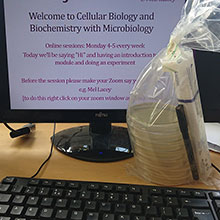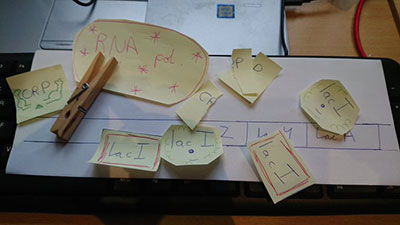Comment: changing with the changes
Issue: Engaging Microbiology
17 May 2022 article

Our nine-year-old read Twenty Thousand Leagues Under the Sea with his class during the pandemic. The motto of Captain Nemo’s Nautilus Mobilis in Mobili, moving in the moving thing or changing with the changes, became our household motto in the dark days. A much-needed mantra that when everything was constantly changing we could roll with the storm, as long as we knew what direction we needed to be going in. As an academic, the direction was the same as it always has and always will be; to look after and educate all my students the best I can and support others to do the same. The pandemic has changed how we teach and work, but more fundamentally, we have changed as individuals, educators and researchers and our students have changed too, with their education being impacted unimaginably.
How have students changed? We have all changed in unquantifiable ways, but perhaps it is important to recognise what hasn’t changed. The overall narrative from our students as to what motivates them is the same now as before the pandemic. Students are motivated by the content they feel is most relevant to them and their chosen careers. Students are engaged by lecturers that enjoy teaching and who are enthusiastic about their subject; I find this reassuring, entirely reasonable and utterly achievable.

Our mode of delivery has changed so much in an incredibly short period of time; from pre-pandemic on-campus teaching to entirely online, through hybrid teaching to predominately face-to-face teaching for most – mobilis in mobili, moving in the moving thing, changing with the changes! Student feedback across the sector indicates a desire to be back on campus but also to have online access to material and content. So how do we accommodate this juxtaposition and provide good learning experiences for students?
Firstly, we need to remember students are a heterogeneous group. The provision of online materials has increased the engagement and attainment for some specific students, often neurodiverse students, those with complex home lives and those with disabilities. There is now a significant number of students with underlying health issues who are not wanting to catch COVID as restrictions ease and campus’ fill up again. For me, it’s important that we look out for these students and maintain as much adaptability as we can to support them, especially those in already marginalised groups.
Secondly, we know as educators some elements of our teaching has been better online. Recorded content on how to write a good CV, tutorials on using pieces of software or doing calculations are more helpful to students than a single face-to-face teaching session. Recorded content allows students to engage with material when they need it, they can digest it in small chunks and return to it at a later date: live help sessions can provide additional support for specific students. Resources such as Lecturemotely, which expanded massively during the pandemic, remain an excellent source of online materials and ideas.
As well as teaching, assessment has changed massively – mobilis in mobili, moving in the moving thing, changing with the changes! Open-book, online exam assessments were used extensively throughout the first 18 months of the pandemic, with many institutes retaining them rather than returning to closed book in-person exams. The use of open-book exams has amplified conversations around the purpose of exams and other assessments. Many (myself included) argue that we live in an information world, so students filling their minds with information to repeat in an assessment isn’t an important skill, and instead, we should focus on students understanding what their knowledge means and how to apply it. Many (myself included) are concerned that open-book exams favour those with a quiet place, surrounded by their notes with a stable internet connection to take their exam; they at best reward those who can google the quickest and at worst risk prolific collusion and cheating. On balance, I think open-book exams are a good thing, so how these assessments are designed is critical to ensuring fair and appropriate assessments. There is a sizeable amount of work being undertaken in the pedagogy community on best practices for open-book assessments, including the ‘How to write an ungoogleable question’ blogs by Dr David Smith.
I feel working during a pandemic, through home schooling, class bubbles bursting, COVID and isolation, has been a form of academic extreme training. Like how runners train at high altitudes, just on Zoom. I think, as is often seen after periods of acute change, there’ll be a swing back in the narrative to returning to the old ways. This is unlikely, and instead we’ll see a new type of higher education teaching and learning landscape emerge. We aren’t through the changes yet; that’s OK though, mobilis in mobili, we know which direction we are going.
Further reading
Dave the Smith. How to write an ungoogleable question part 1; 2021. https://davethesmith.wordpress.com/2021/08/12/how-to-write-an-ungoogleable-question-part-1 [accessed 3 May 2022].
Dave the Smith. How to write an ungoogleable question part 2; 2021. https://davethesmith.wordpress.com/2021/08/19/how-to-write-an-ungoogleable-question-part-2 [accessed 3 May 2022].

Mel Lacey
Senior Lecturer in Microbiology, Howard St, Sheffield Hallam University, Sheffield S1 1WB, UK
Mel Lacey is a Senior Lecturer in Microbiology in the Department of Biosciences and Chemistry at Sheffield Hallam University. Her role at Sheffield Hallam encompasses teaching Microbiology across the undergraduate and postgraduate curriculum, being co-Admissions Tutor for undergraduate degrees and undertaking microbiology and pedagogy research. Her research spans design and delivery of antimicrobials, microbiome: host interactions and environmental microbiology through to citizen science and the accessibility of science in education and the wider community.
Why does microbiology matter?
Because it impacts so many elements of our society, from our health to biotechnology; microbiology is everywhere.
What do you love most about your job?
I love that higher education has the power to transform lives, and I’m really grateful I can be a part of those inspirational journeys (and telling people that microbes are cool is a close second).
Image: Mel Lacey.


